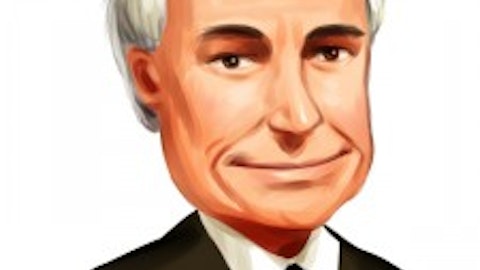Robert Hau: Yes, Darrin, good morning. So a couple of things. One, when we sign a license deal, typically that’s a three or five-year license. You get a large license transaction. December is always a pretty high month for license activity, and you get ongoing maintenance, but license is certainly the big chunk. When you convert, or when a client instead goes to an ASP contract, you book that over the five-year period every single month. On a per account basis, or per transaction per user basis, depending on the product, and depending on the client contracting. We feel good. Ultimately, that’s actually a better economic transaction for us. So, we like that transition. If you look at 2023’s results and you combine the two bank and credit union facing segments, Fintech and payments and network, we did about 6% organic growth on a combined basis.
If you look at our outlook for 2024, we reiterated what we said back in November. We expect that combined segment or the new segment financial solutions, which is largely a combination of the existing Fintech and payment, to be in that 5% to 7% range. And actually accelerate into 2025 and beyond up to 6% to 8%. So feel good about the overall growth of that business. The product portfolio, adding things like CashFlow Central, selling more payment solutions, benefits of Fintech as that goes live and gets deeper into the marketplace. We feel good about overall, our ability to continue to grow our capability selling into the banks and credit unions.
Darrin Peller: Okay. That’s helpful. And then just quick follow-up on the merchant side again. Frank, you’ve talked a lot about the VAS side having a big penetration opportunity up to the mid-20% plus range. I think you had a nice jump this quarter. So, maybe just touch on what drove that, combined with – if you think you have the right assets now, or there’s a lot more chatter over potential for tuck-in’s and M&A again this year as rates may change. So anything on the horizon for you guys? Thanks guys.
Frank Bisignano: Yes. I mean, we really do like our hands across the Board in the company. You’ve seen us add things like Fintech, which I think really compliments our ability to compete anywhere, anyhow, along with DNA, which has really proved itself. If you go to a merchant business, we’re still largely focused on building out more verticals. That would be retail and services and continuing to complement, what we’re doing in Bento. I think – our software stack is strong and we’re continuing to add functionality to it. We think our pen rate will continue, to do what we’ve forecasted. Obviously, we’re always looking at opportunities to invest, as a minority investor and you’ve seen us do that and things like Bento and Fintech and others.
Ondot, which ended up being in more than a thousand institutions, tagged to our mobility product to – give an unbelievable experience to a thousand banks. So I think we feel good about our hand. We’re always looking at can we add software functionality, and you should expect us to continue, to be great stewards of capital deployment, as I hope you all feel we have been.
Darrin Peller: Thanks, guys.
Operator: Next, we’ll go to the line from Timothy Chiodo from UBS. Please go ahead.
Timothy Chiodo: Thanks a lot for taking the question. You mentioned in the prepared remarks a little bit of channel mix shift for Clover. I was hoping you could provide some directional color broad strokes across the 2023 cohort, of new merchants, or volume that came on to Clover, whether it be just kind of order of magnitude across direct sales, bank partners, whether they be JV or non-JV. And then of course, wholesale and retail ISO. And I ask partially, because clearly the differentiation, is partially due to the distribution here, but also so that we could get a better sense, on the portion of revenues that are, hitting adjusted revenue versus, maybe being netted out, or coming below the line in the equity income line?
Robert Hau: Yes, I think we tried to give pretty significant transparency around, the last part of that question with “excess inflation” in interest on in Argentina. Just as a side note, our LatAm business in Argentina business is a great business. Obviously, we’ve got this variation going on, on the “excess”, but that’s a tremendous business. LatAm overall growth in Clover as we bring Clover down to Brazil. We’ll add Mexico later in the year. So, we feel very good about our overall capabilities there. To the first part of the question, I would say broadly we continue to expand our distribution capabilities. We have a long track record of ISO and ISV partners, bank channel partners. We have traditionally not had a big direct business.
That continues to grow, but we also continue to grow pretty meaningfully in the ISV channels – with expansion of ISV capability into Clover. And having that Clover asset makes us a pretty significant partner of choice, not only for ISVs, but also the bank channels. We see growth there. As a percent of growth, our direct business, is probably growing the fastest, but a little bit of it’s the smallest piece. It’s the newest piece of the organization, but we’re seeing good growth across the board.
Timothy Chiodo: Excellent. Thank you for that.
Operator: Next, we’ll go to the line of Dan Dolev from Mizuho Securities. Please go ahead.
Dan Dolev: Hi, guys. Great results here. My quick first question is on, again, back to the value-added services. Really impressive 40% growth. Can you maybe talk a little bit about the split in ’23 between software and capital?
Robert Hau: You’re asking about 2023?
Dan Dolev: Yes, the 40% growth that you mentioned in ’23.
Robert Hau: So, I wouldn’t necessarily have a split for you in my fingertips. So, we can look to get that for you. And I think – I would tell you that it’s been pretty consistent. Obviously, we always have a relatively large software capital software spending, given the nature of our business, and I think that remains relatively consistent.
Frank Bisignano: Dan, were you asking, if you look at the 40%, what component was largely software and what component was Clover capital? Was that the question you’re asking?
Dan Dolev: Yes, exactly on the value-added service.
Frank Bisignano: It’s software dominated. I mean it would be, I’d call it, large majority software.
Robert Hau: Sorry, I heard CapEx spending.
Dan Dolev: Oh, I’m sorry, yes, it’s my Israeli accent.
Frank Bisignano: That’s okay.
Dan Dolev: No, it’s really excellent.
Frank Bisignano: That’s why we got four years here.
Dan Dolev: And then just my quick follow-up, really impressed by the opportunities in Reg II. I mean, one of the networks commented that this was drag. I would imagine this is a big benefit for Fiserv. Can you maybe talk about the size the opportunity here for STAR and Accel?
Frank Bisignano: Well, as I continue to say, we have been committed to debit network, STAR and Accel, their strategic assets within the company. As Reg II turns into reality. You’ve heard us talk about nearly 20 wins. Obviously, we compete at every level. There’s fabulous competition out there for these transactions. But embedded in what we’re looking at is, obviously more opportunity than we had before Reg II and the fact that some of those household names that, you heard like HelloFresh or Lyft, or others give us that opportunity. So, I think it’s off to a decent start. It remains to be determined over the longer haul, but we feel good about the Reg II opportunity.
Dan Dolev: Amazing. Thank you so much.




